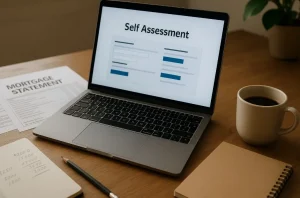Table of Contents
ToggleWhat Does Mortgage Interest Tax Deduction Mean for Property Owners in the UK?
Is mortgage interest tax deductible in the UK? This is a question that frequently arises among both homeowners and landlords, especially in the wake of significant tax reforms over recent years. The answer is not straightforward, as it depends heavily on the type of property and the ownership structure.
In many countries, particularly the United States, homeowners can deduct mortgage interest from their taxable income, providing substantial tax relief. However, the UK tax system operates differently. In the UK, the rules around mortgage interest tax relief have become more complex, particularly for private landlords, following the implementation of Section 24 of the Finance Act 2015.
This blog explores who can still claim mortgage interest relief, how the tax credit system works, and what strategies are available for landlords and property investors to manage their tax position effectively.
How Has Mortgage Interest Tax Relief Changed in the UK?

Historically, landlords were allowed to deduct the full amount of mortgage interest from their rental income before calculating tax. This method directly reduced taxable profit, offering significant relief especially for higher-rate taxpayers.
However, the introduction of Section 24 brought a fundamental shift. Phased in between 2017 and 2020, this reform gradually removed the ability for individual landlords to deduct mortgage interest at their marginal tax rate. Today, regardless of whether a landlord is a basic, higher, or additional-rate taxpayer, they can only claim a 20% tax credit on mortgage interest.
This change has had a considerable impact on the profitability of many rental property portfolios, particularly those held by higher earners. It has also influenced how many investors structure their property businesses, with a noticeable shift toward limited company ownership to maintain full expense deductibility.
Is Mortgage Interest Tax Deductible for Homeowners in the UK?
For individuals who own and occupy their primary residence, mortgage interest is not deductible for personal income tax purposes in the UK. This has long been the case and differs significantly from tax practices in countries like the United States.
Even if you are paying substantial mortgage interest on your main residence, you cannot claim any tax relief unless a specific portion of the property is used exclusively for business purposes. For example, self-employed individuals who maintain a dedicated home office might be able to claim a proportion of the mortgage interest, but this must be calculated accurately and justified with detailed records.
The key point is that UK tax law does not treat home ownership as an income-generating activity. Therefore, mortgage interest on your personal home remains a private expense and is not eligible for tax relief.
Can Buy-to-Let Landlords Still Claim Mortgage Interest Relief?

Yes, but not in the same way they could before 2020. Buy-to-let landlords can no longer deduct mortgage interest from their rental income to reduce their taxable profit. Instead, they now receive a basic rate tax credit equal to 20% of their interest payments.
This system applies uniformly, regardless of the landlord’s overall income or tax band. It means that higher-rate and additional-rate taxpayers are no longer receiving relief at 40% or 45%, a significant reduction in potential tax savings.
Tax Relief Comparison Table
| Scenario | Before Section 24 | After Section 24 (Current) |
| Rental Income | £25,000 | £25,000 |
| Mortgage Interest | £10,000 | £10,000 |
| Taxable Profit | £15,000 | £25,000 |
| Tax (Higher Rate @ 40%) | £6,000 | £10,000 |
| Tax Credit (20% of £10,000) | £0 | £2,000 |
| Final Tax Bill | £6,000 | £8,000 |
The shift from direct deduction to tax credit has resulted in increased tax liabilities for many landlords. It has also prompted many to reassess whether buy-to-let remains a viable long-term investment strategy under current tax rules.
What Types of Property Qualify for Mortgage Interest Relief?
Not all properties are treated equally when it comes to mortgage interest relief. The eligibility for tax relief depends on the type of property and its usage.
| Property Type | Tax Relief Available | Method | Rate |
| Main Residence | No | N/A | N/A |
| Second Home (Personal Use) | No | N/A | N/A |
| Buy-to-Let Property | Yes | Basic Rate Tax Credit | 20% |
| Furnished Holiday Let (FHL) | Yes | Basic Rate Tax Credit | 20% |
| Commercial Property | Yes | Full Deduction | Marginal |
| Properties Held by Companies | Yes | Business Expense Deduction | Corporation Tax Rate |
As shown above, the only routes to claim full mortgage interest deduction are through commercial property ownership or by holding the property in a limited company.
Who Can Claim Mortgage Interest Relief in the UK?
There are three main groups with access to mortgage interest tax relief in the UK, but their entitlements differ substantially.
1. Private Residential Homeowners
These individuals receive no tax relief on mortgage interest unless part of the property is used exclusively for a business purpose.
2. Individual Landlords (Buy-to-Let)
They can no longer deduct interest from rental income. Instead, they receive a 20% tax credit on eligible finance costs.
3. Limited Companies
Companies owning rental properties can deduct mortgage interest from their profits as a business expense. The tax savings are then applied against corporation tax, which is currently set at a lower rate than higher-rate income tax.
Each of these groups must keep accurate documentation of all mortgage interest paid to substantiate their tax claims.
How Do Landlords Claim Mortgage Interest Relief?

Landlords must report all income and allowable expenses via the Self Assessment system. The process involves several stages, and mortgage interest relief must be calculated according to current legislation.
First, landlords must calculate their total rental income. From this, they deduct all allowable expenses except mortgage interest. The resulting figure becomes the taxable profit.
Next, income tax is calculated based on the landlord’s tax band. Finally, a 20% tax credit is applied to the mortgage interest amount.
This means that although mortgage interest is no longer an “expense” in the traditional sense, landlords still benefit from tax relief—just at a lower rate and with a different application method.
What Records Should Be Kept for Claiming Mortgage Interest Tax Relief?
Accurate documentation is essential to ensure compliance with HMRC and to substantiate any tax relief claims. At a minimum, landlords should keep:
- Annual mortgage statements showing interest payments
- Monthly breakdowns of mortgage payments, separating interest from capital
- Rental income records, including bank statements
- Receipts and invoices for property-related expenses
- Tenancy agreements
- Records of any professional fees related to letting or maintaining the property
These documents may be requested by HMRC during an audit and must be retained for several years.
Does Refinancing Affect Mortgage Interest Relief?
Refinancing a buy-to-let mortgage does not affect the eligibility for mortgage interest relief, provided the new loan is used for the same rental property and the property continues to be let commercially.
However, if additional borrowing is secured against the rental property, how that money is used matters significantly.
If the borrowed funds are used for property improvements or further rental investments, the interest may qualify for relief. But if the funds are used for personal expenses such as a car purchase or holiday the interest is generally not allowable.
This distinction underscores the importance of consulting with a qualified tax adviser before refinancing or taking out additional loans.
What Are the Capital Gains Tax Implications When Selling a Rental Property?
When a landlord sells an investment property, Capital Gains Tax (CGT) applies to the profit earned. Mortgage interest relief does not affect CGT directly, but it’s an important part of calculating the property’s overall financial performance.
The gain is calculated by subtracting the purchase price (plus eligible costs) from the sale price. Costs that can reduce the gain include legal fees, estate agency fees, and the cost of capital improvements (but not repairs).
Capital Gains Example
- Purchase Price: £220,000
- Capital Improvements: £30,000
- Sale Price: £340,000
- Selling Costs: £6,000
- Capital Gain: £340,000 – (£220,000 + £30,000 + £6,000) = £84,000
From this, the annual CGT allowance is deducted, and the remaining gain is taxed at 18% or 28%, depending on your income level.
Is Property Investment Still a Viable Strategy Without Full Mortgage Interest Deduction?

While changes to mortgage interest relief have reduced the profitability of buy-to-let for some investors, property remains an attractive long-term investment in many parts of the UK. Factors like rental demand, capital growth, and location continue to play significant roles in determining investment success.
Investors should consider the net return after accounting for tax liabilities. In many cases, using a limited company structure can help restore tax efficiency, particularly for higher-rate taxpayers. Additionally, the rising use of furnished holiday lets and commercial property investments offers alternative routes to claim more generous relief.
Investment decisions should be based on a comprehensive financial plan that includes tax considerations, rental projections, mortgage costs, and capital appreciation potential.
What Strategies Can Help Landlords Maximise Tax Efficiency?
Landlords can take several steps to manage their tax liability effectively:
- Assess whether to invest as an individual or via a limited company
- Ensure all allowable expenses are being claimed
- Consider holding furnished holiday lets or commercial property
- Plan property disposals to reduce capital gains tax
- Maintain excellent record-keeping
- Use financial forecasting tools to model different scenarios
- Seek professional tax advice to align property strategies with personal financial goals
Conclusion: Is Mortgage Interest Still Tax Deductible in the UK?
Mortgage interest is no longer tax deductible in the traditional sense for most individual landlords. Instead, the UK now offers a 20% basic rate tax credit, a measure that has reduced relief for higher earners. Homeowners, meanwhile, continue to receive no tax benefit for mortgage interest unless a portion of the home is used exclusively for business.
For those who invest through limited companies, full interest deductibility remains intact, making this structure increasingly popular among landlords seeking tax efficiency.
Understanding how mortgage interest is treated under current tax laws is essential for making sound investment decisions and ensuring full compliance with HMRC regulations.
Frequently Asked Questions
Can I deduct mortgage interest on my main home in the UK?
No. Mortgage interest on your primary residence is not deductible for income tax purposes.
Is buy-to-let mortgage interest still tax deductible?
Not directly. You receive a 20% tax credit instead of a deduction.
Does holding property in a limited company allow full interest deduction?
Yes. Companies can deduct mortgage interest as a business expense.
Are holiday lets eligible for mortgage interest relief?
Yes, they qualify for the same 20% basic rate tax credit as buy-to-let properties.
How should landlords document their mortgage interest payments?
They should retain annual statements, interest breakdowns, tenancy agreements, and all related invoices.
Does refinancing impact mortgage interest relief?
No, unless the borrowed funds are used for non-property-related expenses.
How does capital gains tax affect landlords when selling property?
CGT is applied on the gain from sale and depends on taxable income and eligible deductions.




